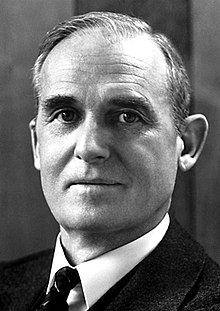William Giauque
| William Francis Giauque | |
|---|---|
 |
|
| Born |
May 12, 1895 Niagara Falls, Ontario, Canada |
| Died | March 28, 1982 (aged 86) Berkeley, California |
| Nationality | American |
| Fields | Physical chemistry |
| Institutions | University of California, Berkeley |
| Alma mater | University of California, Berkeley |
| Doctoral advisor |
George Ernest Gibson, Gilbert N. Lewis |
| Notable awards | Elliott Cresson Medal (1937) Nobel Prize for Chemistry (1949) Willard Gibbs Award (1951) |
William Francis Giauque (/dʒiˈoʊk/; May 12, 1895 – March 28, 1982) was an American chemist and Nobel laureate recognized in 1949 for his studies in the properties of matter at temperatures close to absolute zero. He spent virtually all of his educational and professional career at the University of California, Berkeley.
William Francis Giauque was born in Niagara Falls, Ontario, on May 12, 1895.
As his parents were U.S. citizens, they returned to the U.S. where he attended public schools primarily in Michigan. Following the death of his father in 1908, the family returned to Niagara Falls, where he studied at the Niagara Falls Collegiate Institute. After graduation, he looked for work in various power plants at Niagara Falls both for financial reasons and to pursue a career in electrical engineering. He was widely unsuccessful.
Eventually, however, his application was accepted by the Hooker Electro-Chemical Company in Niagara Falls, New York, which led him to employment in their laboratory. He enjoyed the work, and decided to become a chemical engineer.
After two years of employment, he entered the College of Chemistry of the University of California, Berkeley, where he received a bachelor of science degree with honors in 1920. He entered graduate school at Berkeley, becoming a University Fellow (1920–1921) and a James M. Goewey Fellow (1921–1922). He received the Ph.D. degree in chemistry with a minor in physics in 1922.
Although he began university study with an interest in becoming an engineer, he soon developed an interest in research under the influence of Professor Gilbert N. Lewis. Due to his outstanding performance as a student, he became an Instructor of Chemistry at Berkeley in 1922 and after passing through various grades of professorship, he became a full Professor of Chemistry in 1934. He retired in 1962.
...
Wikipedia
